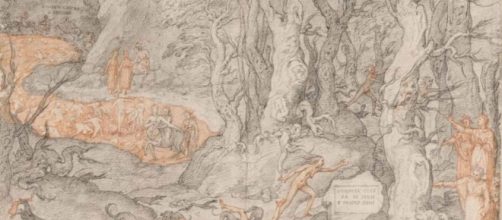Hosting a year-long celebration of death 700 years ago seems a far reach for a bash, even if the honoree is Dante Alighieri, renowned for writing the best literary work ever – "The Divine Comedy."
The Uffizi is going for it and to hear The Guardian tells it, there are party favors for art lovers – a virtual (online) exhibit of rarely seen illustrations for "The Divine Comedy" by Renaissance artist Federico Zuccari.
More to come
But that’s just the beginning of Uffizi’s celebration. The Art Newspaper reports that come March, the museum will offer art inspired by Dante’s poem that will feature Michelangelo, Botticelli, and Blake.
Also in the mix will be Pontormo’s vision "Expulsion from Paradise." If ever an artist needed attention, it’s him given the raw deal that art historian Vasari dealt him in his 1550 tome “Lives of the Most Excellent Painters, Sculptors, and Architects.”
Spoiler alert
Art historian Elizabeth Pilliod referred to that raw deal in her 2001 book “An Introduction to Vasari Story,“ pointing out that the Renaissance historian, who was a painter in his own right, vied with Pontormo for commissions. She saw that rivalry as the reason Pontormo got mocked so mercilessly, such as being so nervous while executing a commission that he kept re-doing it. Vasari wrote: “He racked his brain for ideas so hard that it was piteous.”
Words matter
Clearly, Vasari’s account of Pontormo racking his brain for ideas had its effect.
An entry in the Uffizi catalog says that Pontormo was “heavily influenced by Masaccio,” such as the serpent wrapped around a tree in "Expulsion from Paradise." But wait, lots of artists borrow from their peers. Even Vasari had to admit that all the celebrated painters in Florence studied Massachio’s frescoes “extensively” for tips on good painting. And as Picasso famously said, "Good Artists Borrow, Great Artists Steal."
Smear tactic
But Vasari wasn’t wrong to fault Pontormo for taking too much time thinking about his work and not finishing it. But isn’t that the very same work habit said of Da Vinci? It took him three years to paint The Last Supper. He had his excuse. As Mark Steel Lecture on BBC recounted it in 2003, the painter had a hard time figuring out how to lend spirituality to Christ’s head.
He never did finish the head.
Falsely accused
Pontormo never refuted Vasari’s mockery. His diary, held in the National Central Library in Florence, makes clear that he knew he was obsessive, He also acknowledged hypochondria and melancholia. Vasari piled on, anyway, writing that Pontormo feared dying to such an extent that he stayed clear of crowds for fear of getting crushed to death – as if any of that had something to do with his ability to paint.


